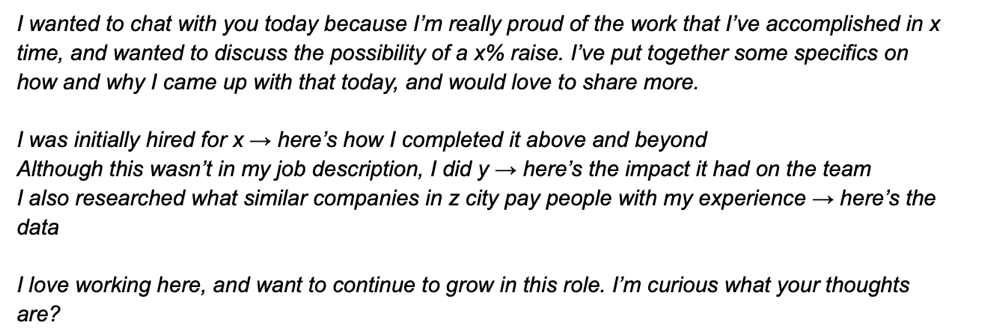Strategies for getting a raise
<div class="user-question">Hi Frich! I want to approach my boss at work about getting a pay raise. How can I prepare to make sure I get the raise I want?</div>
First - proud of you for asking for the raise!! It isn’t always easy to advocate for yourself, but it’s important to build up that muscle.
So here’s some stuff to consider in preparing for the conversation ⬇️
1️⃣ Ask yourself if now is the right time
This means a few things!
Is there a set time of year for making that type of ask (e.g. bonus season or review season). If so, it’s best to time it around then because most managers can’t just go find more money for you, even if they wanted to. There may be a system in place already for these kinds of discussions, at certain times of year.
<div class="frich-tip">Frich tip: Check an employee handbook, ask a peer, go to HR, or ask your manager directly about how it works at your company!</div>
By “the right time”, I also mean your own tenure at the company. If you’ve only been in the role for a few months, it’s too early to be asking for more money. But if you’ve been there for 1+ years, and if you’ve made some pretty strong contributions already, the timing may be right!
2️⃣ Have really specific impact metrics ready to go
The main question you are answering when going into a salary or raise negotiation is “why?”
Let’s break this down:
- What have been your main responsibilities in this role? A great place to start is your offer letter/initial job description. What were you hired to do? What projects have you been assigned? What areas have been your domain?
- Within each of those, what have been some of your biggest wins? For example:
- What projects did you accomplish ahead of schedule or particularly efficiently?
- What work have you been most praised for at the company?
- Where did you make things more efficient or innovative?
- Where did you go above and beyond or take initiative?
- When did you close a particular deal, client, or partnership that was particularly impactful?
- You also should focus on where you have actively improved. If your manager asked you to improve in a particular area, how did you go about improving and what evidence do you have of that improvement?
The most important thing is to tie your impact to your manager, team, and ultimately the company in general. If you’ve moved the needle for the business in some way, that’s the ultimate answer to “why should I give you a raise?"
3️⃣ Do some market research
I have a love/hate relationship with Glassdoor, but it’s a really useful tool to benchmark what other companies pay people at your level, in your city. It’s always helpful to have those numbers in your back pocket as another way to speak to why your salary should be increased.
I would caution against only using ChatGPT for this kind of research, because you risk pulling really inaccurate data, which you wouldn’t want to bring to a salary negotiation!
4️⃣ Practice!!!
I know this may feel a little goofy, but practice the conversation to yourself in the mirror, into a voice memo, or with a friend (or all of the above). Talking about money can be uncomfortable, but if you practice the speech aloud, you’ll be more confident and less rambling.
Here’s a little structure to get you started:

Ultimately, you want to root the conversation in facts and gratitude.
5️⃣ Pick a designated time to have the conversation
I would not just tack this on to a regular check-in with your manager. If there is a set time for performance reviews/raise conversations, then that’s easy. But if you don’t have anything like that scheduled, I would find time with your manager just to discuss the raise.
My take is that you let your manager know ahead of time that is what you want to discuss with them, so that they aren’t blind-sided and have a chance to both mentally and practically prepare. For example, they may need to go do their own research on what is possible before even coming to the conversation.
6️⃣ Send an email after the meeting documenting what you discussed
In the world of work, nothing is real until it is written down!! Send an email follow up with all the specifics of what you shared so that the record lives somewhere, but also so that your manager can have that information on hand when they have to go to the powers-that-be to control the purse strings. Again, keep in mind that your manager may not have as much authority on raises as you think. But if you arm them with lots of data and facts, that’s the best way for them to go out and get you what you can!
7️⃣ Be ready for a no, not right now, or not enough
There are so many factors that go into getting that raise. Economic conditions. Company finances. Legal loopholes. Bad management.
So when do you walk away? It’s a really personal decision. Here are some questions I would ask myself if it DOESN’T go your way:
- Did I not get the raise because my manager/leadership didn’t take me seriously? Or was it simply that there wasn’t the money, but they are willing to keep me around in other ways?
- Is the salary I’m making unsustainable, even though I love my job?
- Is this job a stepping stone to other things, and the raise was just a nice-to-have?
- Did I feel respected throughout the conversation and process in general? Or is it part of a larger pattern of me feeling undervalued?
- Are there things that I can negotiate outside of salary like work from home days, transportation benefits, etc.?
<div class="frich-tip">Frich tip: Rejection is never easy, but entering the conversation feeling calm & confident will bring you the best results. If you're looking for a little boost, try out Headspace!</div>
Found this valuable? Here are some more deep dives from the Frich team 🤝
✅ What am I supposed to do with my salary?
✅ Is money making you miserable?
✅ How do I ace my next job interview?
Good luck with asking for that raise!! You got this.
Mariam from Forward

